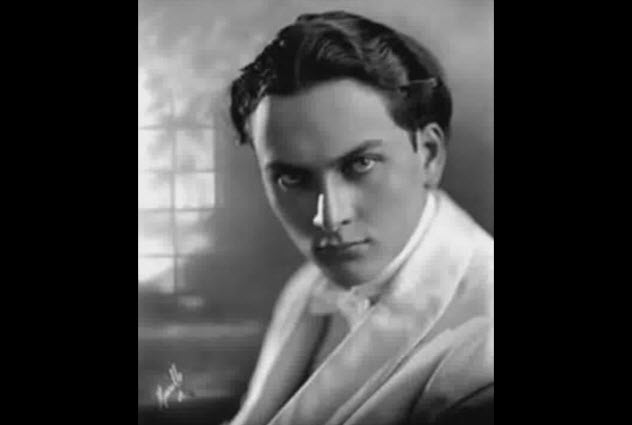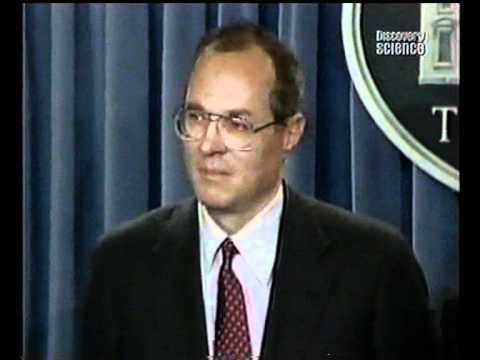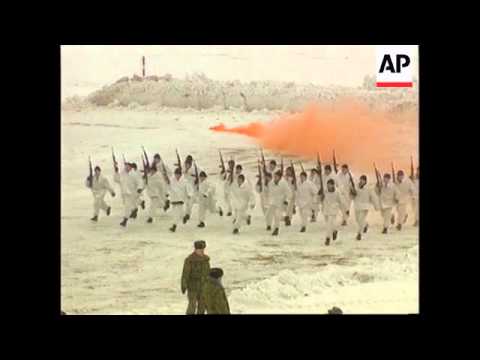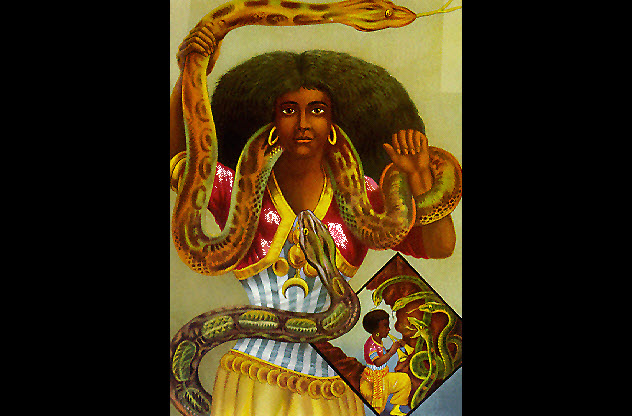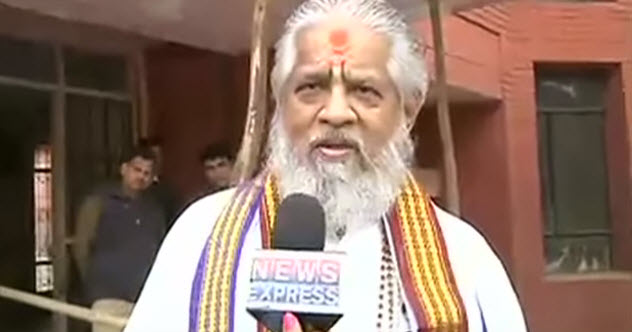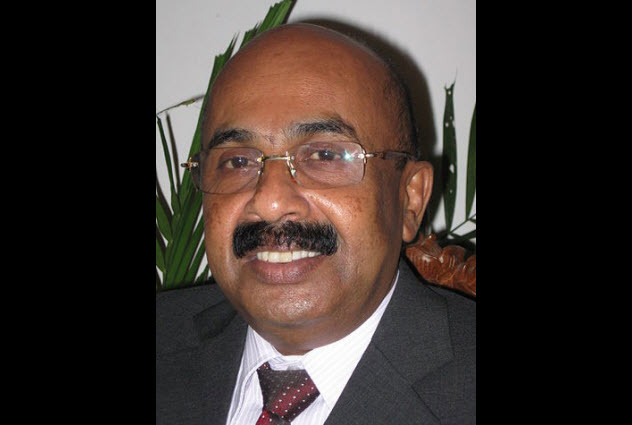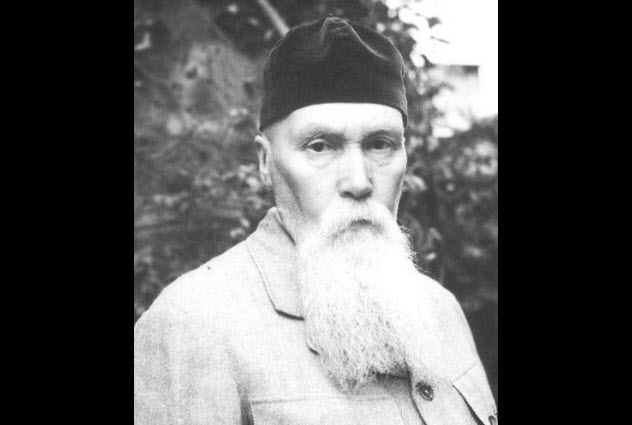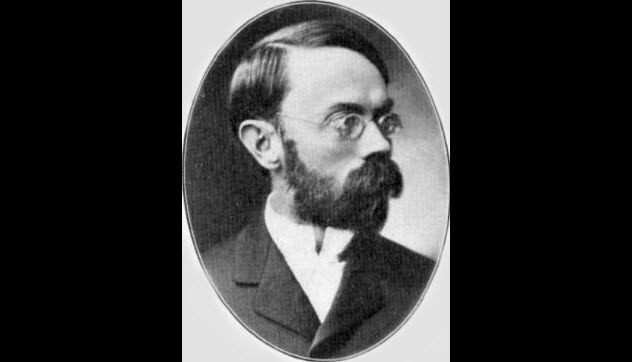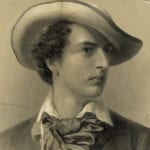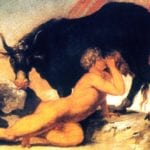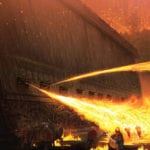10 Manly P. Hall
Ronald Reagan captivated America with his lofty, almost mystical rhetoric. But much of it was lifted almost verbatim from the works of occultist Manly P. Hall. In 1944, Hall wrote The Secret Destiny of America, a book that described a hidden philosophical order that was guiding the US toward a great destiny. According to Hall, the delegates were hesitating to sign the American Declaration of Independence on July 4, 1776, when a mysterious man entered the Philadelphia statehouse through a locked door. He gave a speech to bolster the morale of the delegates. As he ended his stirring oration with “God has given America to be free,” the delegates rushed forward and signed the Declaration of Independence. But when they turned around, the mysterious man had vanished. Hall wondered if this man had been “one of the agents of the secret order, guarding and directing the destiny of America.” Hall’s book caught the attention of the young movie star Reagan, who adopted many of its stories and philosophies. As a representative of General Electric, Reagan gave a speech at Eureka College, his alma mater, saying: “This is a land of destiny, and our forefathers found their way here by some divine system of selective service gathered here to fulfill a mission to advance man a further step in his climb from the swamps.” Then Reagan recounted the story of the unknown orator. In 1974, a now politically active Reagan spoke to the Conservative Political Action Conference, saying: “You can call it mysticism if you want to, but I have always believed that there was some divine plan that placed this great continent between two oceans to be sought out by those who were possessed of an abiding love of freedom and a special kind of courage.” This was a theme to which he would return many times during his presidency. He also recounted the story of the unknown orator in a 1981 article for Parade Magazine. Interestingly, Hall seems to have based the story on a collection of folktales published in 1847 by George Lippard, a social reformer and close friend of Edgar Allan Poe. Lippard implied that he had made up the story, but neither Hall nor Reagan realized that. Hall had first received a copy of “The Speech of the Unknown” from a member of the Theosophical Society.
9 Joan Quigley
The Gipper wasn’t the only Reagan in the White House with a soft spot for woo. Both Ronald and Nancy Reagan had a history of consulting astrologers. The most prominent was the famous Hollywood astrologer Carroll Righter (aka the “gregarious Aquarius”). In the 1950s, Ronald Reagan and then Nancy Davis consulted Righter for advice on their acting careers. Righter continued to influence Reagan after he entered politics. However, Righter ultimately annoyed Nancy Reagan when she consulted him regarding Reagan’s planned presidential bid in 1976. Righter told her that it wasn’t a good time. She became angry when he wouldn’t explain why. Although Righter was correct, Nancy Reagan found a more amenable astrologer in Joan Quigley, who was introduced to her by talk show host Merv Griffin. Quigley was snobbish, though. She would only do readings for certain individuals. “People who are successful or famous always have easier charts to read than the average Joe Blow,” she explained to People magazine in a 1988 interview. Quigley assisted Reagan during his 1980 presidential bid, which she felt was better aligned with the stars than his 1976 attempt. She also did a reading on Jimmy Carter and concluded that Reagan would have no trouble defeating him. However, the Reagans were forced to distance themselves from Quigley after catching heat from the Federation of American Scientists. But things changed after the 1981 assassination attempt on Ronald Reagan. From 1981 to 1988, Nancy Reagan consulted with Quigley regularly to organize her husband’s schedule. Mrs. Reagan marked the president’s calendar with colors that indicated the astrological prospects. Green was good, yellow was iffy, and red was bad. As a result, Quigley’s astrological readings ultimately influenced the timing of press conferences, debates, foreign negotiations, Congressional requests, and Air Force One departures. In the end, however, the Reagans disavowed their relationship with Quigley, who got her revenge in a scathing memoir.
8 Dzhuna Davitashvili
The Soviet Union was supposedly the land of scientific materialism, where astrology was officially defined as a “false science.” Yet many people, including members of the Communist Party, maintained a variety of superstitious beliefs. The wife of a government official once said, “It is our secret silliness.” She claimed that she immediately looked up Mikhail Gorbachev’s sign when he became the Soviet leader. He was a Pisces. One of the most famous occultists in the Soviet Union was Eugenia “Dzhuna” Yuvashevna Davitashvili, who was supposedly the faith healer for Soviet leader Leonid Brezhnev. Davitashvili claimed to be able to cure ailments as varied as cancer, heart attacks, bad circulation, and AIDS with a device known as a Dzhuna Stimulator. Asked in the 1990s how she developed the device, she replied, “Probably space gives me some information. But space, this is God. Probably God marked me in the field of science.” Before working in healing research at science institutes in Moscow, Davitashvili had supposedly demonstrated her abilities in a series of experiments in Tbilisi in 1979. Rumors abound that she treated Brezhnev on his deathbed when conventional medicine had failed. But she claimed that she couldn’t discuss it due to the Hippocratic oath. After the Soviet Union collapsed, she was linked to President Boris Yeltsin. Along with others, she was said to have supported Yeltsin at the Russian White House during the failed coup in 1991 by communist hard-liners.
7 Karl Malchus
According to academic Helmut Werner, the alchemist Karl Malchus convinced Heinrich Himmler in the 1930s that paraffin, stones, and soil from the bed of the Isar River could be transmuted into gold. The Nazi regime could then use this gold to buy armaments and technology. The alchemist told Himmler that his mystical processes would “allow me to produce gold in abundance for the future and security of the Third Reich.” Malchus was installed at the Dachau concentration camp as a technician. Although participants in his experiments were searched to ensure that they weren’t sneaking in gold, Malchus was able to hide gold nuggets from nearby rivers in his cigarettes. Then he passed them off as alchemical productions. When his scheme was discovered, Malchus was imprisoned for several years. Eventually, he was released with a warning not to speak of Himmler’s involvement. Werner claims that Malchus may have been a fraud who was working for British intelligence the entire time. However, this wasn’t the first time that Himmler had fallen for the claims of a dubious alchemist. Throughout the 1920s, Heinz Kurschildgen had made wild claims of being able to transmute uranium into radium and produce gold from a bottle filled with water and sand. Despite being imprisoned for fraud, he would later arouse the interest of Himmler and Nazi economic adviser Wilhelm Keppler with claims that he could transmute gasoline out of water. When he failed to produce good results, Kurschildgen was imprisoned in a concentration camp. Joseph Goebbels later mocked Himmler for being taken in by such an obvious charlatan.
6 Aliodor Manolea
When Traian Basescu was reelected president of Romania in 2010, a close associate of defeated candidate Mircea Geoana appeared to joke that Basescu’s victory had been assured by a “violet flame.” He explained that the president had worn purple ties and sweaters as a way to deflect negative energy. At first, people laughed, and then they forgot about it. But Geoana continued to speak about the matter seriously, claiming that he had been targeted by waves of negative energy that made him lose concentration during the final presidential debate. The person responsible for these supposed attacks was parapsychologist Aliodor Manolea, a controversial figure who could be seen on video standing behind the president during the debate. Photos emerged of Manolea standing near the president throughout his campaign. The scandal soon dominated the media, taking attention from more serious concerns like budget law and an upcoming IMF visit to secure a national loan. The Romanian Association of Transpersonal Psychology claimed that Manolea’s specialities were mind control, clairvoyance, and hypnotic trance. The Liberal Democratic Party could only give vague, evasive answers as to what he was doing at the campaign events and the debate. Later, Manolea was sued by two women after he failed to cure them of cancer by changing the structure of their DNA.
5 Ndeh Ntumazah
Cameroon independence activist Ndeh Ntumazah used the occult to obscure his political organization from colonial rule. The British allowed political parties from Nigeria to enter Cameroon but only if they had no communist affiliation. Ntumazah brought a political party together as an occult organization called Mamie-Wata, which was said to specialize in healing and sensitizing people to disease. They held nighttime masses with candles and incense and gave each other Sephardic code names like Araphabel, Zadkielabel, and Lucifer. The political occult group had a song: Mamie-Wata, Mamie-Wata, Mamie-Wata, logho ma-yi ngoe, Mamie-Wata, Mamie-Wata, Mamie-Wata, logho Mukara ngoe! When translated, the song says: Mamie-Water, Mamie-Water, Mamie-Water, Take the motherf—ker away, Mamie-Water, Mamie-Water, Mamie-Water, Take the English colonialists away! One member of the society claimed that the group also believed in the powers of transmigration. He said that he had seen his pregnant mother, a member of the Razielabel group, suddenly vanish when their home was raided by thugs who wished to punish a woman who “has decided to become a man and is teaching other women to refuse to listen to men.” Ntumazah continued to use the Mamie-Wata group to politically organize on the sly without the colonialists noticing until he launched the One Kamerun Political Party in 1957.
4 Sri Chandraswamy
In 1975, India’s Deputy High Commissioner Shri Natwar Singh was asked by the mystic Sri Chandraswamy to arrange a meeting with Margaret Thatcher, who was the new leader of the UK’s Conservative Party. Despite her sensible political persona, Thatcher agreed. According to Singh, Chandraswamy was so excited that he “banged [his] staff on the road till I told him to stop doing so.” With Singh as reluctant interpreter, Chandraswamy went to Thatcher’s office dressed as an ascetic sadhu with traditional rudraksha mala beads, a tilak mark on his forehead, and a staff in his hand. When asked why he wanted to see her, he replied, “Tell her she will soon find out.” Chandraswamy eventually gave Thatcher five strips of paper. He asked her to write questions on the strips and then predicted what she had written. Although Singh was horrified when Chandraswamy sat on the couch in a lotus position, Thatcher was apparently intrigued. She asked more questions until the mystic suddenly decided that the meeting was over. Telling Thatcher to wear a red dress and a talisman to their next meeting, Chandraswamy declared that it would be held the following Tuesday at Singh’s house. Despite Singh’s initial protests, Thatcher showed up. Chandraswamy then predicted that she would be prime minister for nine, 11, or 13 years. This prediction was ultimately correct because Thatcher’s term was 11 years. According to Singh, he bumped into Thatcher again in 1979 in Lusaka, Zambia. Singh whispered to the prime minister, “Our man proved right.” Thatcher responded, “High Commissioner, we don’t talk about these matters.”
3 Sumanadasa Abeygunawardena
For 10 years, Mahinda Rajapaksa was the authoritarian president of Sri Lanka. He relied deeply on the advice given by his personal astrologer, Sumanadasa Abeygunawardena, for about 31 years. Abeygunawardena, who referred to Rajapaksa as “Our Sir,” took credit for presidential victories in 2005 and 2010. Rajapaksa increasingly took counsel from the astrologer toward the end of his tenure. In 2015, the astrologer advised the president to hold a snap election, promising a “resounding victory.” In an interview, Abeygunawardena claimed that the election date, January 8, was auspicious for Rajapaksa. His prediction was based on numerological calculations indicating that eight was the president’s lucky number. The time that the nominations were handed over was also auspicious. Abeygunawardena had said that 10:48 AM was “a strong time the bird becomes king.” When asked to explain what that meant, Abeygunawardena replied, “There is another doctrine called Pancha Pakshi. His bird is Bherunda. That time was that bird’s. It was the best time according to astrology and other aspects.” However, Rajapaksa lost his presidency in a massive defeat. Abeygunawardena was somewhat sheepish about the loss. He said, “Not all of Nostradamus’s predictions have come true, either. [ . . . ] There was only so much I could do to help him win, maybe five percent. But you must have luck to be the president.” Fortune changed for Abeygunawardena, too. He lost access to a bungalow and a limousine which had been provided gratis by the president until then. Abeygunawardena was also forced to give up a position on the board of a state-run bank. According to the astrologer, he had done all that he could to help the president, but Rajapaksa had accepted the unlucky chairmanship of the Commonwealth of Nations against Abeygunawardena’s advice. He alluded to the fate of another politically deposed Commonwealth of Nations chairperson, ex–Australian Prime Minister Julia Gillard. Abeygunawardena claimed, “That office is a crown with thorns. I told him not to take it. See what happened to Gillard? The same thing happened to Our Sir.”
2 Nicholas Roerich
Nicholas Roerich, a Symbolist painter and esoteric Russian thinker, captivated Americans with pearls of wisdom, such as: “When the supremacy of the densified Astral Body is realized, then the locks of the Fourth Gate will unbolt.” Roerich and his wife, Helena, had developed a philosophy known as Agni Yoga. It combined elements of Theosophy, Hinduism, and Tibetan Buddhism. Agni Yoga tracts such as Fiery Stronghold and Flame in Chalice were read earnestly by Henry Wallace after he met Roerich in 1929. The future US vice president would write to the guru in spiritualistic terms, such as: “Long have I been aware of the occasional fragrance from that other world, which is the real world. But now I must live in the outer world and, at the same time, make over my mind and body to serve as fit instruments for the Lord of Justice. [ . . . ] Yes, the Chalice is filling.” As Franklin Roosevelt’s secretary of agriculture, Wallace appointed Roerich as the head of a departmental expedition to Central Asia to collect drought-resistant grass. Instead, Roerich roamed around with an armed band of Cossacks and tried to encourage a Buddhist revolt. Rumors abounded, with some saying that Roerich hoped to overthrow the USSR. Others claimed that he was looking for signs of the Second Coming. In the meantime, Roerich’s teachings influenced Wallace into placing the mystical pyramid from the American Great Seal on the $1 bill. After Wallace discovered the ongoing debacle in Central Asia, he severed contact with Roerich and had him investigated by the IRS. Roerich leaked letters from Wallace to the press, which included bizarre references to Britain, Japan, and the Soviet Union: “The Monkeys are seeking friendship with the Rulers so as to divide the land of the Masters between them. The Wandering One thinks this, and is suspicious of Monkeys.” The FDR administration forced Wallace to brand the “guru letters” as forgeries. Then the administration warned the Republicans that if they talked about the letters, the Democrats would respond by bringing up the topic of Wendell Willkie’s philandering. Excerpts from the letters were finally released in 1948 by an anti-Roosevelt columnist. But Wallace denied them, and Roerich had already died in India one year earlier.
1 Marcia Champrey And Charles ‘Doc’ Sawyer
In February 1920, Florence Harding and four other political wives visited a “seeress” named Madame Champrey (aka Madame Marcia). Mrs. Harding was so impressed that she returned incognito for a private session. Madame Marcia was famous in Washington for her zodiac, tarot, and crystal ball readings. Mrs. Harding asked for the horoscope of a man born on November 2, 1865, at 2:00 PM, which was her husband. Madame Marcia told her that the man was a great statesman and would become the president of the United States. She also mentioned that the man would be prone to adulterous affairs and melancholia. However, that was commonly known in Washington at the time. Prior to and during the early Harding administration, First Lady Florence Harding continued to consult regularly with Madame Marcia. Mrs. Harding asked for zodiac readings and the answers to specific questions about members of her husband’s cabinet and administration. Madame Marcia made her most shocking prediction during Harding’s 1920 presidential campaign. She said that Harding would die a “sudden, violent, and peculiar death by poison.” The first lady also believed in homeopathy, especially the work of Charles “Doc” Sawyer. In 1916, he had treated Mrs. Harding for a range of symptoms—including heart palpitations, indigestion, and abdominal pain—with a combination of “dark pellets,” “green medicine,” “white tablets,” and “yellow pellets.” During a 1923 trip to Alaska, the president fell ill after eating crabmeat and was treated by Sawyer with “purgatives” and heart “stimulants” delivered by hypodermic needle. President Harding ultimately died, apparently confirming the power of Madame Marcia’s predictions but not Sawyer’s homeopathic medicine. David Tormsen read the back of Vladimir Putin’s palm and has been seeing stars ever since. Email him at [email protected].
